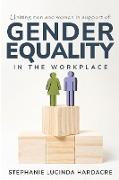- Start
- Mobilising Men and Women in Support of Workplace Gender Equality
Mobilising Men and Women in Support of Workplace Gender Equality
Angebote / Angebote:
The burden of achieving gender equality is typically placed on women, limiting men's
involvement in the movement. In contrast to work focusing on women's experiences as targets of
discrimination, we propose a solidarity-based approach positioning men and women as agents of
change, which relies on two key processes: leadership - particularly leadership as a form of
influence based on shared identities among leaders and followers, and political solidarity as a way
to mobilise the silent majority (men) to work as allies beside a minority (women) and embrace
equality as a common cause for both groups.
This thesis examines how to mobilise a broader audience for gender equality, and how
leadership and social identity dynamics affect that mobilisation. Three empirical programs
(totalling six experiments) investigate how best to increase women's and men's support for
equality. Key independent variables of interest are leader gender, message framing, and social
identity. Program 1 examines whether solidarity-based frames are more effective than traditional
frames which focus on either fixing (Experiment 1, N = 338) or blaming women (Experiment 2,
N = 336). Program 2 investigates how emphasising different levels of subgroup and
superordinate identities (Experiment 3, N = 251, Experiment 4, N = 319) affects men's
mobilisation. Program 3 investigates whether positioning men as being responsible for gender
inequality (Experiment 5, N = 258), or being fellow victims of gender inequality (Experiment 6,
N = 543) affects their mobilisation.
Folgt in ca. 10 Arbeitstagen
